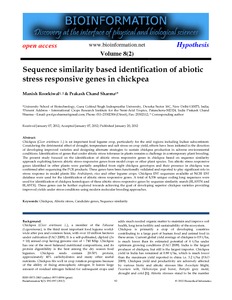Sequence similarity based identification of abiotic stress responsive genes in chickpea
Abstract
Chickpea (Cicer arietinum L.) is an important food legume crop, particularly for the arid regions including Indian subcontinent.Considering the detrimental effect of drought, temperature and salt stress on crop yield, efforts have been initiated in the directionof developing improved varieties and designing alternate strategies to sustain chickpea production in adverse environmentalconditions. Identification of genes that confer abiotic stress tolerance in plants remains a challenge in contemporary plant breeding.The present study focused on the identification of abiotic stress responsive genes in chickpea based on sequence similarityapproach exploiting known abiotic stress responsive genes from model crops or other plant species. Ten abiotic stress responsivegenes identified in other plants were partially amplified from eight chickpea genotypes and their presence in chickpea wasconfirmed after sequencing the PCR products. These genes have been functionally validated and reported to play significant role instress response in model plants like Arabidopsis, rice and other legume crops. Chickpea EST sequences available at NCBI ESTdatabase were used for the identification of abiotic stress responsive genes. A total of 8,536 unique coding long sequences wereused for identification of chickpea homologues of these abiotic stress responsive genes by sequence similarity search (BLASTN andBLASTX). These genes can be further explored towards achieving the goal of developing superior chickpea varieties providingimproved yields under stress conditions using modern molecular breeding approaches

